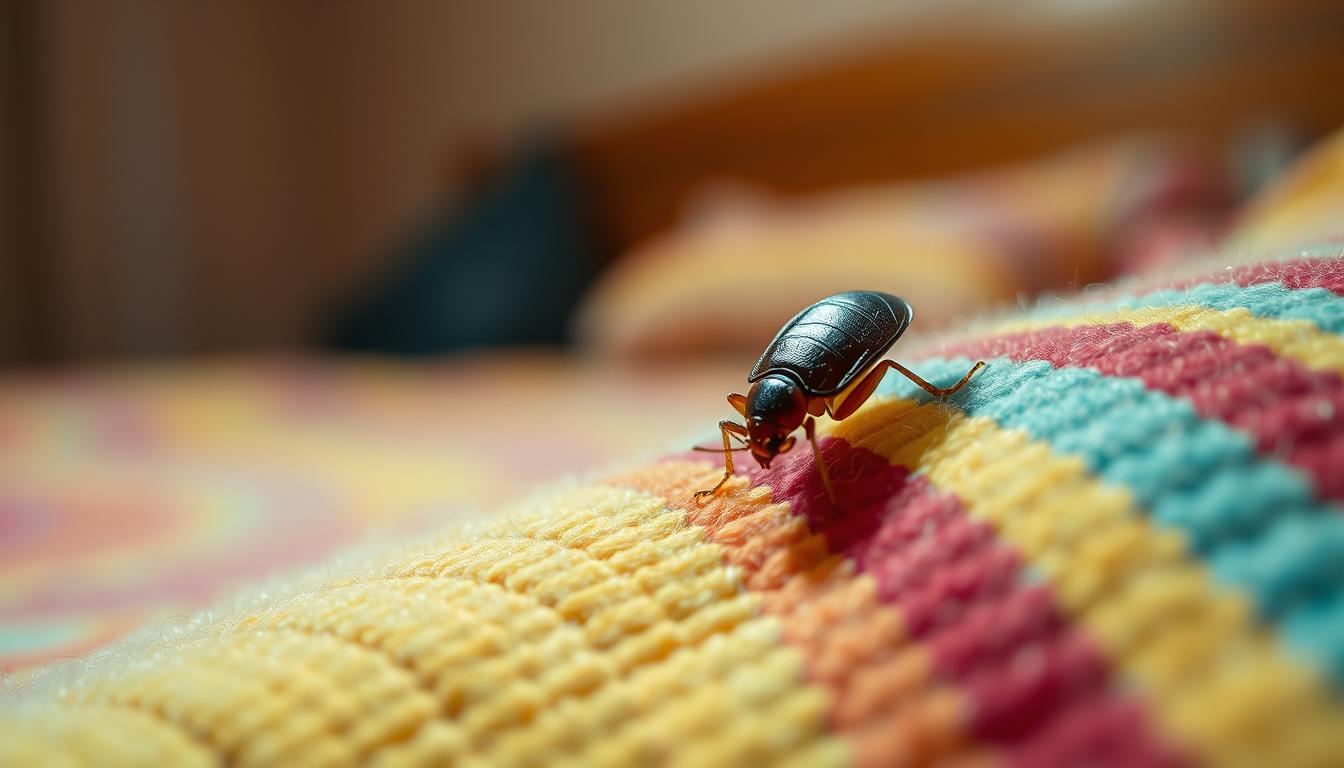Did you know bed bugs can even infest the cleanest homes? A recent study showed a huge 80% increase in bed bug cases in the US over ten years. This fact makes many homeowners look for new ways to fight these pests, like using fabric softener.
The saying “Goodnight, sleep tight. Don’t let the bedbugs bite” might comfort some. But for those fighting bed bugs, it’s far from reassuring. This article will give you the latest on repelling bed bugs. We’ll look into fabric softener’s effectiveness and other natural ways to control these pests.
Contents
- 1 Understanding Bed Bugs and Their Behavior
- 2 The Myth of Dryer Sheets as Bed Bug Repellents
- 3 Exploring Natural Bed Bug Repellents
- 4 Preventive Measures
- 5 Does Fabric Softener Keep Bedbugs Away?
- 6 Alternative Bed Bug Control Methods
- 7 Consulting Professionals
- 8 Fact vs. Fiction
- 9 Conclusion
- 10 FAQ
- 10.1 What causes bed bug infestations?
- 10.2 Can fabric softener or dryer sheets repel bed bugs?
- 10.3 Are there any natural or alternative methods to control bed bugs?
- 10.4 What are the best preventive measures against bed bugs?
- 10.5 When should I contact a professional for bed bug treatment?
- 10.6 What are some common myths and misconceptions about bed bugs?
Key Takeaways
- Bed bug infestations have increased by 80% in the US over the past decade.
- Fabric softener is a commonly used, but unproven, method for repelling bed bugs.
- Natural and alternative methods, such as diatomaceous earth and essential oils, may be more effective in controlling bed bug infestations.
- Preventive measures, like regular cleaning and disinfecting, are crucial for keeping bed bugs at bay.
- Consulting professional exterminators is often necessary for eliminating severe bed bug problems.
Read: Do Dryer Sheets Repel Bed Bugs? Find Out Now
Understanding Bed Bugs and Their Behavior
Bed bugs are tiny, night-loving pests that feed on human blood. They are known for their sneaky ways and can live in many places. Let’s explore their habits and what leads to bed bug infestations.
What Causes Bed Bug Infestations?
Bed bug infestations have grown a lot lately, mainly because of more travel and pesticide-resistant bugs. These pests can easily hide in luggage, clothes, or furniture, spreading quickly from one place to another. In places like apartments, they can move easily between units, making the problem worse.
Bed bugs like warmth, blood, and carbon dioxide, which humans give off. They usually make their nests close to where people sleep. But they can travel up to 100 feet in one night. They can also live for up to a year without eating, showing why we need to act fast to stop them.
- Bed bugs are attracted to warmth, blood, and carbon dioxide
- They can travel up to 100 feet in a single night
- Bed bugs can survive for up to a year without feeding
Knowing about bedbug behavior, bedbug identification, bedbug breeding, bedbug habitat, bedbug travel, and bedbug feeding patterns is key to fighting these pests and preventing future problems.
“Bed bugs are the perfect hitchhikers, able to travel from one location to another with ease, making them a persistent and challenging pest to control.”
Read: What Pillows Do Hotels Use? – Discover the Secret
The Myth of Dryer Sheets as Bed Bug Repellents
Many people think dryer sheets can help with bed bugs. They believe the strong scent from the sheets can hide the carbon dioxide we breathe out. This makes it hard for bed bugs to find us. But, this idea is mostly a myth with little science to back it up.
Procter & Gamble, the company behind Bounce dryer sheets, says their product doesn’t kill or keep bed bugs away. Rutgers University also says dryer sheets aren’t a good way to fight bed bugs.
Some people say dryer sheets work, but there’s no solid proof they do. Relying on them could make bed bug problems worse. It’s better to look for proven natural bed bug deterrents or get help from experts.
“Dryer sheets are not effective in killing or repelling bed bugs,” stated a representative from Procter & Gamble.
If you want to keep bed bugs away, try proven methods or talk to pest control pros. Dryer sheets may smell nice but aren’t a good way to fight bed bugs.
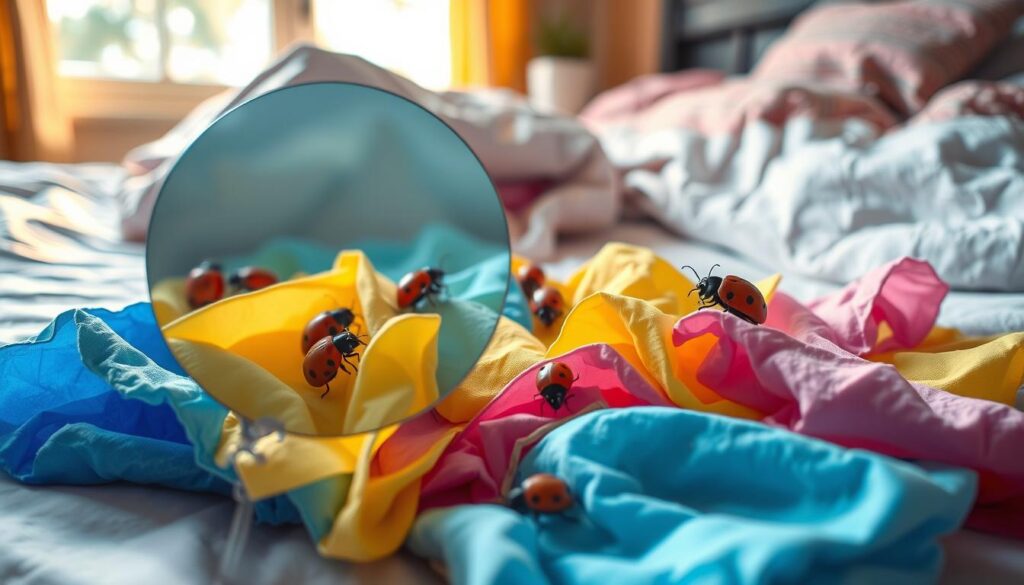
Exploring Natural Bed Bug Repellents
Many homeowners are looking for safe and green ways to fight bed bugs. They’re interested in natural repellents like diatomaceous earth and essential oils.
Diatomaceous Earth: A Powerful Mineral
Diatomaceous earth (DE) comes from the fossilized remains of tiny sea creatures. It’s sharp edges can harm bed bugs by causing them to lose water and die. But, it’s important to use a special DE product for bed bugs to avoid health risks.
Read: How to Get Smell out of Towels – Working Method
Essential Oils: Fragrant Bed Bug Repellents
Essential oils like thyme, oregano, and clove can keep bed bugs away. They make a bad smell that confuses the bugs. But, you need a lot of these oils to kill bed bugs, which isn’t always practical.
Looking into natural repellents is a good idea, but remember they might not work as well as chemical ones. Always do your homework and test them out before using them alone to fight bed bugs.
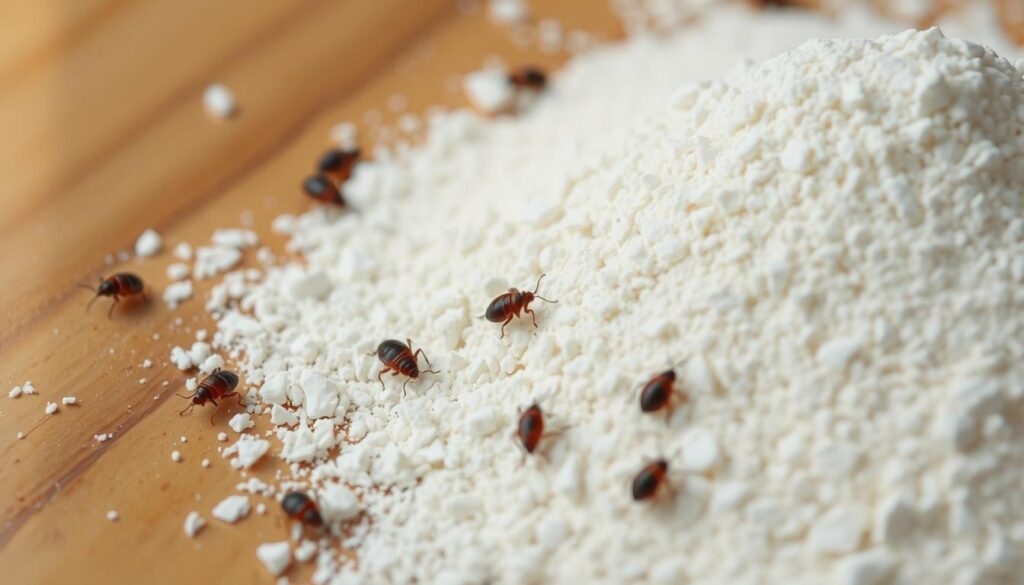
| Natural Repellent | Effectiveness | Drawbacks |
|---|---|---|
| Diatomaceous Earth | Effective at killing bed bugs by damaging their exoskeletons | Potential health hazard if inhaled; requires careful application |
| Essential Oils | Can deter bed bugs with their strong scents | Less potent than synthetic pesticides; higher concentrations required |
Preventive Measures
Stopping bed bug infestations is key. Regular cleaning and disinfecting of your bedding is a proven way to do this. Heat kills bed bugs, so wash your bedding and dry it on high heat for at least 30 minutes to get rid of any bugs or eggs.
If you already have bed bugs, you need to act fast to stop them from spreading. Put clean laundry in new plastic bags that are bug-free and seal them. This helps prevent bed bugs from getting into your clean items and starting another infestation. Also, put everything waiting to be washed in plastic bags to stop bed bugs from infesting something clean.
Regular Cleaning and Disinfecting
Keeping your living space clean and disinfected is key to bed bug prevention methods. Here are some tips to keep your home bed bug-free:
- Wash all bedding, including sheets, blankets, and pillows, in hot water (at least 120°F/49°C) and dry them on high heat for at least 30 minutes to kill any bed bugs or eggs.
- Vacuum thoroughly, paying special attention to crevices, seams, and other potential hiding spots for bed bugs.
- Use a heat treatment method, such as a handheld steamer or a professional heat treatment service, to eliminate bed bugs in hard-to-reach areas.
- Regularly clean and disinfect areas around the bed, including the mattress, box spring, and frame, using a strong bed bug cleaning and disinfecting solution.
By following these bed bug prevention methods regularly, you can greatly reduce the risk of an infestation. This keeps your living space healthy and free from pests.
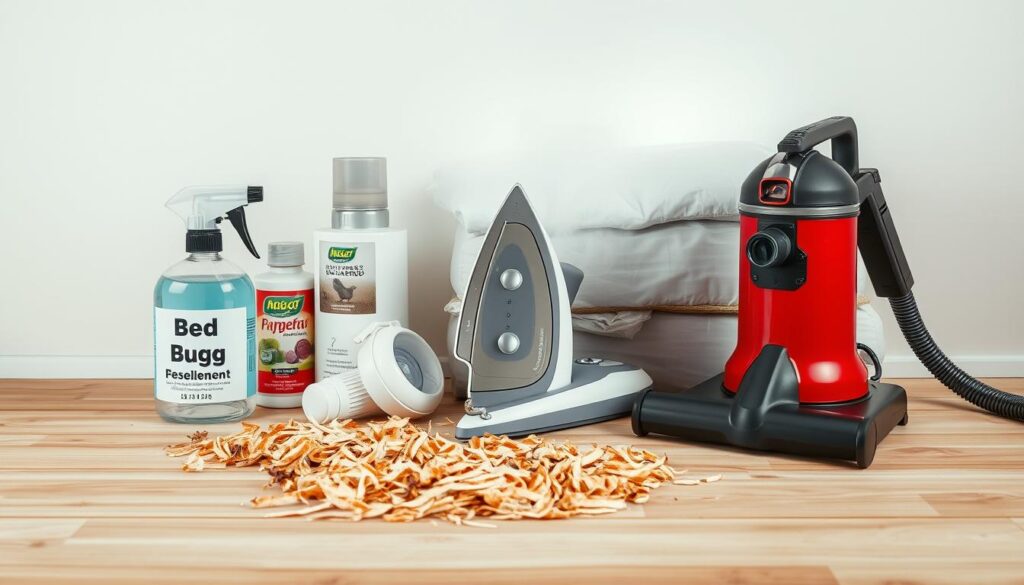
Does Fabric Softener Keep Bedbugs Away?
Many homeowners look for simple ways to fight bed bugs. They often use items they have at home. Fabric softener, especially dryer sheets, is one such item that people think might help. But, does it really work?
Experts on bed bugs say no. They found no proof that fabric softener or dryer sheets keep bed bugs away. Even Procter & Gamble, the maker of Bounce dryer sheets, says their product doesn’t repel bed bugs.
While fabric softener and dryer sheets won’t hurt anything, they’re not a good way to fight bed bugs. They don’t offer enough protection against these tough pests. Homes and businesses need better solutions.
“Fabric softener and dryer sheets do not repel bed bugs. There is no scientific evidence to support their effectiveness as a bed bug deterrent.”
Instead, people should look into proven ways to control bed bugs. Options like diatomaceous earth, essential oils, or getting help from pest control experts work better. These methods are more reliable in fighting does fabric softener repel bedbugs and fabric softener bed bug effectiveness.
In conclusion, fabric softener isn’t a good solution for bed bugs. It’s better to use proven methods and get help from experts. This way, you can effectively deal with household items bed bug deterrents.
Alternative Bed Bug Control Methods
Chemical treatments are often the top choice for getting rid of bed bugs. Yet, some homeowners look for natural ways to fight these pests. Vinegar and petroleum jelly are two common items found in homes that can help control bed bugs.
Vinegar: A Versatile Bug Deterrent
White vinegar is great for keeping bed bugs away and killing them. It has acetic acid that messes with the bugs’ nervous system. But, vinegar doesn’t last long, so it won’t touch eggs or bugs hiding in other spots.
Petroleum Jelly: A Sticky Trap
Petroleum jelly can stop bed bugs from climbing up furniture. Put a thick layer of it around your furniture’s legs. This traps the bugs and stops them from getting to where they want to go. It won’t kill bugs or their eggs, but it can slow down an infestation.
These natural methods can help with bed bugs, but they shouldn’t be the only thing you do. For a full solution, mix them with other effective ways like cleaning and disinfecting. This will help you tackle the problem better.
| Natural Bed Bug Remedy | How it Works | Key Advantages | Potential Limitations |
|---|---|---|---|
| Vinegar | Disrupts the bed bugs’ nervous system |
|
|
| Petroleum Jelly | Creates a physical barrier to prevent bed bugs from reaching their target |
|
|
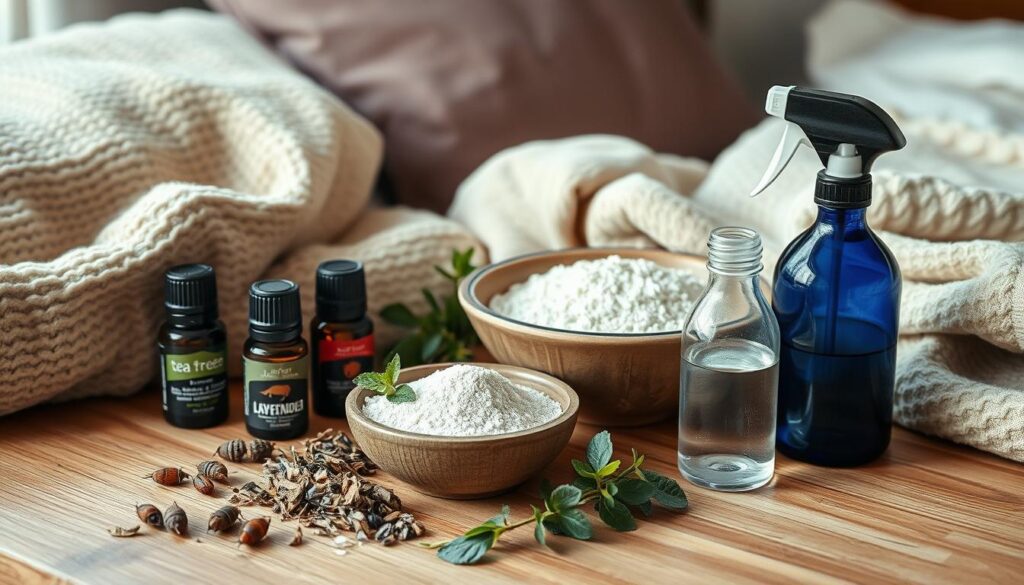
Using natural bed bug remedies can help, but they should be part of a bigger plan. For a big or tough problem, it’s best to talk to a professional pest control expert.
Consulting Professionals
Dealing with bed bugs is tough, and pest control services are key. They have the skills, tools, and plans to get rid of bed bugs for good.
If you think you have bed bugs, act fast. Call your local health department, landlord, and professional bed bug exterminators. Trying to get rid of them alone can make things worse.
Experts offer bed bug treatment options like insecticides, steam cleaning, and special equipment. They also use advanced methods like heat and cryogenic freezing for tough cases.
Working with professional bed bug extermination pros means a thorough and quick fix. They’ll create a plan just for you, ensuring bed bugs are gone for good.
Don’t wait to get help for bed bugs. Pest control services for bed bugs save you time, money, and stress. With their help, you can have a bed bug-free home again.
Fact vs. Fiction
There are many myths and misconceptions about bed bugs that can make controlling and preventing them harder. It’s important to know the bed bug facts from the bed bug myths. This helps you take the right steps to deal with any infestations.
Many think that dryer sheets or fabric softener can keep bed bugs away. But, these items are not a reliable way to control bed bugs for a long time. The real truth about bed bugs is that they need more thorough treatment to get rid of them.
- Bed bugs are tough pests that can live through many conditions, including being near common household items.
- While diatomaceous earth and essential oils might help a bit, they’re not a good replacement for professional pest control.
- Cleaning and disinfecting regularly can help prevent bed bugs, but it’s not enough to stop them for sure.
For bed bug control, it’s smart to follow advice from pest control experts and scientific studies rather than home remedies. Knowing the facts about bed bugs helps you protect your home and avoid the trouble of a lasting infestation.
| Bed Bug Myths | Bed Bug Facts |
|---|---|
| Dryer sheets and fabric softener can repel bed bugs | These household items are not reliable long-term solutions for bed bug control |
| Bed bugs only infest dirty homes | Bed bugs can infest any home, regardless of cleanliness |
| Bed bugs transmit diseases | Bed bugs are not known to transmit any diseases to humans |
Conclusion
Fabric softener does not effectively repel or control bed bugs. It might not harm anything, but it’s not enough to fight bed bugs alone. Experts, research, and proven methods are key when dealing with bed bugs.
Understanding bed bug behavior and exploring natural and alternative control methods helps. Talking to experts is also crucial. This way, people can protect themselves and their homes from bed bugs.
The key takeaways on fabric softener and bed bugs stress the need for professional pest control for lasting results. A summary of bed bug control methods shows the importance of a comprehensive approach. Homeowners and renters should stay alert and trust credible sources for safety and comfort.

